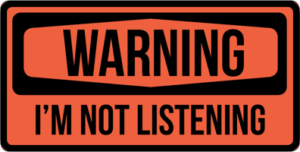 I have to confess that I’m not a good listener. That’s why I’m sort of an expert on this subject and can write about it.
I have to confess that I’m not a good listener. That’s why I’m sort of an expert on this subject and can write about it.
My lack of listening is caused by a combination of the following:
- I am very objective-oriented, so the relentless pursuit of an objective (which I’m pretty good at) results in dialing out all the noise around me. Trouble is, much of that noise is needed and good stuff.
- I make decisions and get to the bottom line very quickly, which is good some of the time, but it can result in missing the nuances or even other options.
- I have five radio stations going on in my head, all playing loudly and competing for attention – which makes listening very difficult. My wife says I may have attention deficit disorder, which is possible.
- I don’t like superficial talk, even though I myself engage in it. What’s the real point? What’s important here? That’s what matters to me.
All of this contributes to my not listening well.
OK, I told you my story. What’s yours? Why don’t you listen well to your caseload donors?
Think about it. There could be some solid, objective reasons. You could be wired like me. Or maybe you just don’t really care, because all that matters is the money you can get from them.
I find this such an interesting topic because the truth is that there is far more wisdom, truth and enlightenment outside of you and me than inside of us. A wise person once said: “There is wisdom in counsel.” And it’s true. The counsel of those outside us is so rich with facts, principles and life guidance that it’s a shame to waste it.
But we do.
And the very thing that will make you successful with your donors will come from them, not from the brilliant plan you have created for them.
Here’s how I’ve dealt with my tendency not to listen well. I regularly tell myself:
- That there is wisdom to collect from everyone outside of me regardless of race, religion, age, gender, sexual orientation, nationality or station in life. I believe I can find wisdom from the homeless man, the rich entrepreneur, the paraplegic, the transgender person, the child, the employee, the Indian in the Amazon, the woman in the retirement home, the cleaning man, etc. Everyone has it, and I need to listen and be curious to find it.
- That there are other options and ways different from what I am thinking and concluding that I should consider. So I’m curious to find them.
- To be open to the views, opinions and thoughts of others.
- To seek out advice from experts in the field. Early in my career I was hired to help a medium-sized commercial company diversify from a single product focus to multiple products. I was to do this through mergers, acquisitions and new product development. The first thing I did was to find three Fortune 500 experts in mergers, acquisitions and new product development, and I paid them to tell me how they did it. They told me what to do and what not to do, and I successfully (after five years and with the help of others) diversified the company, which is still a vibrant, profitable and growing entity today. The counsel of others – that is what did it.
Here’s the big point I want to make. We all have a tendency to do our own thing and listen to our own voice, rather than seek the wisdom and truth others hold. Your caseload donors have that truth embedded in them. It’s your path to success. And you will find it IF you are curious and you listen.
Your path to success is knowing what drives them and what they care about. They will not only give you that information (if you’re curious and you listen); they will also show you HOW to deal with them – your communication style, your cadence, your choice of messaging etc.
But you have to listen. How are you controlling and managing your tendency not to listen? That’s the thing to deal with. Because that one item will either be the block to your success, or the doorway to a great deal of joy for you and your donor.
Richard





Good awareness. Being present curious, and ask questions strengthens authenticity and relationships….in my experience.